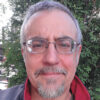Jonah suddenly became a favourite book of mine after I went to Iraq.
Forget the fish! The book is a comedic satire against ethnocentrism, nationalism and a narrow-minded exclusivity regarding God. In the story, the whiny fellow is sent 900 kilometres to Nineveh, now the site of Mosul, the second-largest city of Iraq. Nineveh was the capital of the reigning superpower at that time.
Jonah is so sure of himself and so sure that God is wrong, that he has no hesitation in telling God so! Jonah’s nationalistic and ethnocentric theology is that God is for his people, that is, the Israelites, not the Assyrians of Nineveh. This attitude continues right through Chapter 4—after the Ninevites repented and God relented. Jonah complains about that, then about the heat. A plant grows in one day for shade, then gets eaten by a bug, and Jonah complains about that too! That’s funny. That’s satire—irony, humour and exaggeration used to convey criticism and expose hypocrisy.
The point of the story is that the one and only creator of all things is concerned about all lands, and the flourishing of all people. (In fact, the animals are also protected.) And the different cultural practices of the Ninevites in their rituals of repentance were accepted by God. The message is clearly against ethnocentrism, the belief in one’s cultural superiority, in this case, that one culture understands that one God best.
Mosul is the site of Jonah’s tomb. Well, it was there until 2014, when the Islamic State blew it to smithereens. Fundamentalist Muslims thought they understood what God wanted, and expressed it with explosives despite other believers’ understandings. The irony! The shrine built at the tomb of Nabi Yunas (Prophet Jonah) was a site of pilgrimage for Muslims, Jews and Christians.
Who are the faithful believers that understand God? Jonah? Ninevites? Which Christians? Believers from what part of the Christian world? What about Muslims? The geographic centre of Christianity has shifted; Africa is now the continent with the largest proportion of the global Christian population. How will that change our understandings of God and the practice of faith? Will Canadian Mennonites go beyond accepting African music in the hymnal?
The Chaldean Catholic Church is headquartered in Baghdad, Iraq. It is one of several Catholic denominations and is in communion with the one headquartered at the Vatican. Unless something happens between the time I write this and the time you read it, Pope Francis will have gone to Iraq, specifically to Mosul and the plains of Nineveh. The region is the historic heartland of more than 19 centuries of Christianity. Francis intends to encourage the most beleaguered Christian communities in the world. Only 100 years ago, Christians were about 20 percent of Iraq’s population. They are down to about 3 percent now. Persecution and emigration have taken a toll. The Pope also travels for dialogue with the most important Shi’ite cleric in the country, as he has been doing with other Muslim clerics.
The issues in Iraq—Kurds and Arabs and Sunni and Shi’ite and others—are expressions of ethnocentrism. Frankly, so was military invasion by western powers. So is the Canadian history of anti-Black/Chinese/Indian racism. And residential schools. And the weak effort at “reconciliation” with the Indigenous peoples. Christians have often been ethnocentric. Similarly, attitudes of superiority, racism and religious nationalism are at work in Israel’s vaccinating of Jewish citizens but not Palestinians.
Can we get the message? Jonah is a bozo. Don’t be like Jonah.
Randolph Haluza-DeLay participated in a Christian Peacemaker Teams delegation to Iraqi-Kurdistan in 2018.
Read more Mind and Soul columns:
The practice of Lent
The practice of faith
A gift to faith
See all of me
Living well together









Leave a Reply
You must be logged in to post a comment.